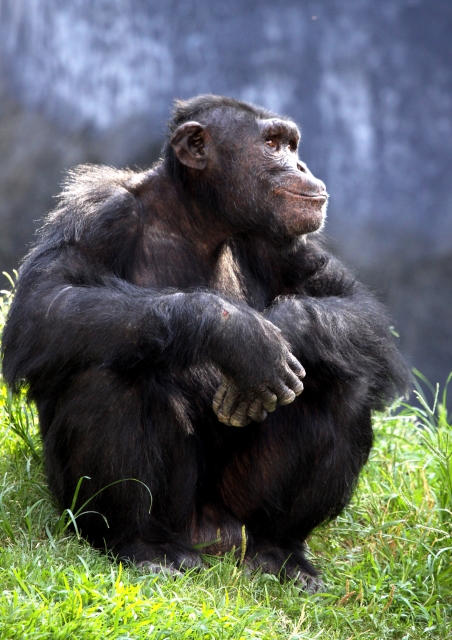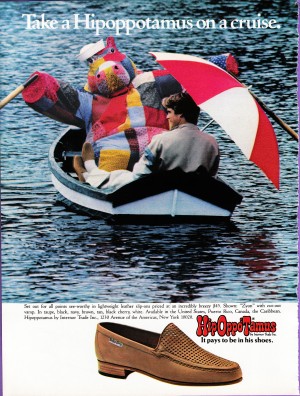1980s
In the Heat of the Night
Somehow, I lived through the 1980s without becoming aware of the German disco singer Sandra.
My good luck has failed me, however, as I willingly subjected myself to this video.
Three questions:
1) How many musical instruments did they ruin in that shower?
2) Why has the noble clapstick faded from today's pop music?
3) Is the keytar the wussiest instrument known to man?
Posted By: Paul - Thu Sep 23, 2010 -
Comments (10)
Category: Music, Baths, Showers and Other Cleansing Methods, 1980s
Weird Animals - Och Aye The Roo!

Of course, this won’t be news to one member of Britain’s thriving rod-fishing community, who this week caught a piranha in his local pond (Guardian).
Another place you might not expect to see exotic creatures is on your lunch menu, but that didn’t stop one restaurant owner in Mesa, AZ from putting “lion burgers” on the menu to celebrate soccer’s World Cup. Cameron Selogie of the Il Vinaio makes his “mane course” with genuine lion meat imported from South Africa, earning him the ire of local animal rights groups and several death threats, but not a reprimand from health officials. According to an FDA spokesman serving lion meat is perfectly legal, as long as it’s not roar (Scotsman).
Slightly luckier than the lions, one cat who has fallen on his feet is Oscar, a housecat from the Isle of Jersey in the UK, widely billed as the “bionic cat” after successfully receiving two artificial hind legs to replace the ones he lost in an altercation with a combine harvester (BBC News).
You might think pitting a rodent like mammal against a 12 tonne Triceratops makes for an equally one-sided match up, but evidence emerged recently that our primitive ancestors occasionally feasted upon dinosaurs. Seventy-five million year old “gnaw marks” of a kind characteristic of early mammals, and belonging to a creature not much bigger than a squirrel, have been found on the fossil bones both of Tricerotops and the crocodile-like predator Champsosaurus (LiveScience).
Sadly today the nearest we get to dinosaur flesh is turkey or chicken, but not all birds were prized solely for their meat. The huia bird of New Zealand for example, was once used to make the feathered head-dresses of Maori chiefs, until predation from accidentally introduced species drove it to extinction around 1907. But if the bird has gone its feathers have not, and one recently became the most expensive feather ever when it sold at auction for NZ$8000, i.e. $4000 American (Telegraph).
More in extended >>
Posted By: Dumbfounded - Mon Jun 28, 2010 -
Comments (4)
Category: Aliens, Animals, Dinosaurs and Other Extinct Creatures, Cryptozoology, Food, Overpriced Merchandise, Pets, Cats, Rants, Warnings, Jeremiads, Prophecies and Cassandra-like Figures, Science, Violence, 1980s
Follies of the Mad Men #84
[From Playboy for April 1983.]Here's the thing about visual icons: you should know what their standard meaning is before you attempt to use them.
Rowboat plus lake plus two individuals equals romance. Or fishing buddies. That's it, your only two choices. With the presence of a gaily striped parasol and the lack of fishing equipment, however, you're pretty much limited to romance.
So what this ad is saying is: "Wear our shoes and all your dates will look like hippos." Or possibly: "Those who wear our shoes are closet furries." Or maybe: "Our customers work for a carnival and like to spend their leisure time in costume."
Take your pick.
Posted By: Paul - Mon Jan 25, 2010 -
Comments (8)
Category: Animals, Business, Advertising, Products, 1980s
Bad Boys Blue
Well, at least the "bad" part was accurate in the name of the group Bad Boys Blue.
Posted By: Paul - Mon Jan 11, 2010 -
Comments (1)
Category: Music, 1980s, Europe
They Had That Back Then? #3
Today's lesson: Flat Screen TV (this is a long one to make up for not posting anything in a while).
From the February 1972 issue of Popular Science.
More in extended >>
Posted By: Salamander Sam - Sat Oct 31, 2009 -
Comments (9)
Category: Technology, Television, 1960s, 1970s, 1980s
Car Talk
Is anyone else reminded of the callers on Coast to Coast AM?
Posted By: Salamander Sam - Tue Oct 13, 2009 -
Comments (9)
Category: Technology, 1980s, Parody, Cars
Diggi-Loo, Diggi-Ley
Time to make fun of the Eurovision Song Contest again. Here's the winning entry from 1984.
Posted By: Paul - Mon Jun 29, 2009 -
Comments (5)
Category: Contests, Races and Other Competitions, Music, 1980s, Europe
Flexi Discs

Visit this great site for a history of this odd phenomenon. Be sure to look at the Flexi Disc stamps from Bhutan!
Posted By: Paul - Sun May 24, 2009 -
Comments (2)
Category: Music, Technology, 1960s, 1970s, 1980s, 1990s
The Big Snit
Personally, I would happily watch a TV show titled "Sawing for Teens."
Posted By: Paul - Thu Apr 02, 2009 -
Comments (4)
Category: Death, Destruction, Disasters, Domestic, Marriage, Games, War, 1980s, North America
The Chipettes
How did I never know till now that Alvin & the Chipmunks had female analogues in The Chipettes? Here, they sing one of my favorite songs--and I don't half mind their rendition!
Posted By: Paul - Sat Mar 28, 2009 -
Comments (6)
Category: Animals, Music, Cartoons, 1980s

| Who We Are |
|---|
| Alex Boese Alex is the creator and curator of the Museum of Hoaxes. He's also the author of various weird, non-fiction, science-themed books such as Elephants on Acid and Psychedelic Apes. Paul Di Filippo Paul has been paid to put weird ideas into fictional form for over thirty years, in his career as a noted science fiction writer. He has recently begun blogging on many curious topics with three fellow writers at The Inferior 4+1. Contact Us |





